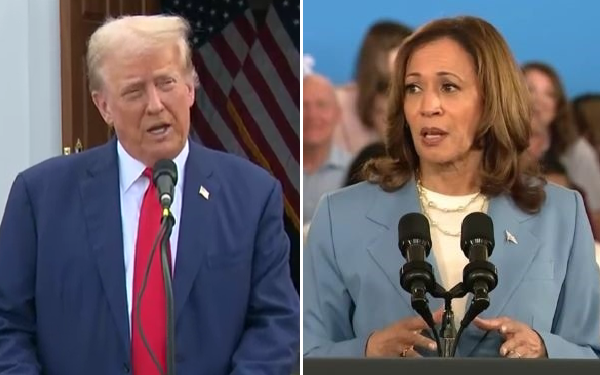
Coke vs. Pepsi, Hertz
vs. Avis, Oreo vs. Hydrox -- these brand battles played out on TV in commercials that many of a certain age can still remember.
But when it comes to
presidential politics in 2024, does TV still play a central role in the selling of the president? Are Trump and Harris Coke and Pepsi?
The 1969 bestseller
The Selling of the President 1968 by Joe McGinnis positioned the presidential race that year in marketing terms. The original cover featured Richard Nixon’s face on a cigarette
pack.
Theodore White’s famed quadrennial book series “The Making of the President” started with the 1960 campaign.
Many look back on the 1960 campaign as a watershed in the influence of TV on the presidential elections. White wrote subsequent books on the 1964, ’68 and ’72
campaigns.
advertisement
advertisement
But TV was a presidential player even before 1960. The campaigns of the 1950s were supported by TV commercials. Conventions were first televised
nationally in 1952.
Presidential candidates have long been thought of in terms of brands. Trump and Harris are “brand” names. Or in the case of
Harris, “Kamala” might have a slight edge over “Harris.”
But are the two nominees just “brands” in name only? In the
aggregate, this summer’s polling has the candidates more or less running neck-and-neck. The electorate once again seems split down the middle.
The
TV Blog’s impression of the campaign messaging from the candidates and the national news media that have clearly taken sides in this election is that both candidates and their media
allies are preaching to their respective choirs.
It never seems as if anyone attends Trump rallies other than his supporters. The same goes for the Harris
campaign.
Bits and pieces of these campaign appearances turn up on the news channels and network newscasts and depending on the cable channel, get either
praised or vilified.
It is so obvious that it is almost funny how the news channels’ websites play the news on the candidates they clearly
favor.
Monday at 2:30 p.m. (eastern), the lead headline on CNN.com was: “Prominent conservative endorses Harris, calls Trump a threat to
democracy.”
On FoxNews.com at the same time, the lead story was this: “Democrats’ platform repeats critical error 19 times when mentioning
Biden.”
Farther down on the Fox News site, the news was even more dire for Harris, according to this damning headline: "Diners furious after eatery
cleared for 'staged' VP Harris stop."
The message was that Kamala Harris stands in the way of ordinary
Americans who just want to eat their lunch.
That’s an entertaining story, but it is doubtful that many
Americans from either camp are visiting the opposition media to learn about alternative points of view that, heaven forbid, they might even calmly consider.
Thus, stories about prominent conservatives rejecting Trump and lunch-goers going hungry because of Harris are of interest only to the partisan patrons of these news sites that preach only
to them.
This week, all eyes are on the Democrats as they mount their convention in Chicago where they will try to define the Harris brand.
Thursday night is the most important night, and the one that gets the most viewership at any convention. It is
the night Harris will deliver her acceptance speech.
On July 18, Trump’s closing speech at the GOP convention drew just north of 25 million on TV platforms. Perhaps
Harris can do the same.
In the brand battles cited at the top of this blog, the brands doing the battling were more
or less the same thing -- two Colas, two rent-a-car companies and two kinds of sandwich cookies.
Unlike them, Trump and Harris are not Coke and Pepsi at all.
They are more like Pepto-Bismol and Pepsi.